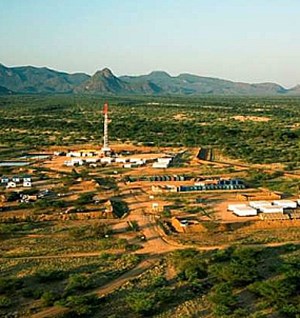Congo’s upcoming oil block auction runs into environmental issues
(Bloomberg) — The Democratic Republic of Congo’s plan to auction oil exploration blocks next month threatens to disrupt some of the world’s most important carbon sinks and could jeopardize a $500 million forest preservation agreement.
Some of the blocks, estimated to contain 16 billion barrels of crude reserves, overlap with the biggest tropical peatlands that cover 145,000 square kilometers (56,000 square miles) and store about 30 billion tons of carbon -- equivalent to about 82% of annual global carbon dioxide emissions. So-called carbon sinks help mitigate greenhouse-gas emissions from burning fossil fuels and other activities.
Protecting the wetlands and the wider Congo Basin tropical rainforest was the subject of one of the landmark agreements of last year’s COP26 climate conference in Glasgow. Under the pact with the Central African Forest Initiative, Congo will get the funding over five years, provided it meets agreed milestones.
“This letter of intent commitment will begin with a comprehensive analysis of the extent to which mining, oil and gas titles overlap with, or impact on protected areas, high value forests and peatlands,” CAFI said in an emailed response to questions. “Donors are working closely with the DRC government to ensure that the commitments outlined in the letter of intent are met.”
CAFI is a partnership created in 2015 between a coalition of European countries, the European Union, South Korea, and the UK as well as the six Congo Basin nations. It seeks to curb the loss of forests in the region.
“The geology, geography and environment experts from the Ministry of Hydrocarbons have worked meticulously on the selection of the oil blocks, taking into the account the environmental sensitivities,” the government said in a video in May about the block tenders, seen by Bloomberg. “The desire of the head of state is to consider the exploitation of the oil resources of the DRC but also the protection of nature.”
Releasing Carbon
The two aims are unlikely to be compatible, said Simon Lewis, a professor of global-change science at University College London.
The ecosystems “have to maintain their wetness to keep all the carbon locked in. If there are drilling platforms you will potentially disturb the peatlands, potentially dry it out and release some of the carbon,” Lewis said in an interview. “They are some of the most carbon-dense systems on Earth. This is the place you would go first to protect carbon.”
Under the agreement with the partnership, Congo has committed to placing 30% of its area under protection status and restoring 8 million hectares (19.8 million acres) of degraded land and forests. The mineral-rich country will also halt mining and hydrocarbon extraction in protected areas if it leads to deforestation, according to the letter of intent. The Congo Basin is the world’s second-biggest tropical forest, after the Amazon.
The oil block auctions will be held on July 28 and July 29, according to the government.
“The invitation to big oil companies to trash Congo’s most sensitive ecosystems and drill into the carbon bomb of peatlands is a historic error that must be scrapped immediately,” said Irene Wabiwa Betoko, international project leader for the Congo Basin Forest for Greenpeace Africa.



